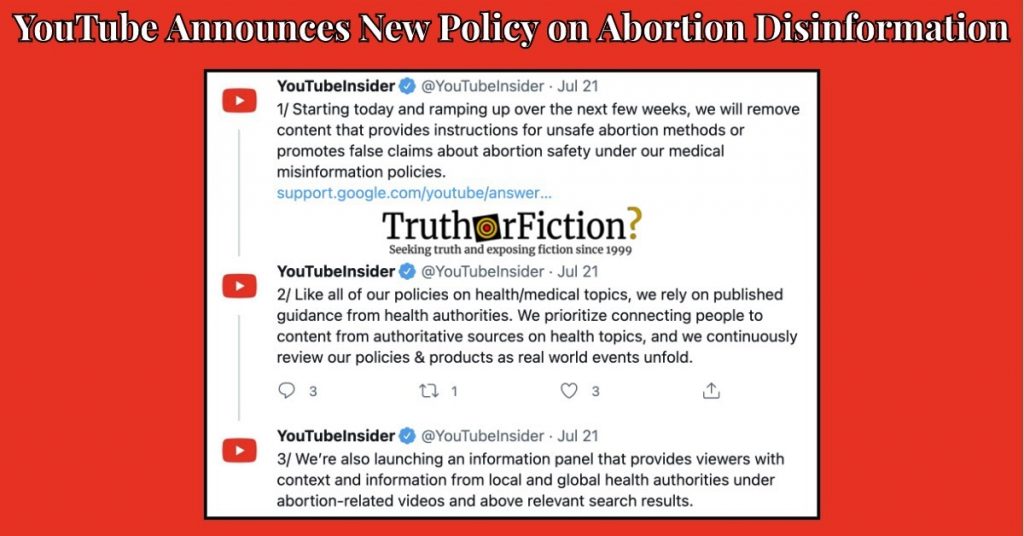Nearly a month after the Supreme Court overturned Roe v. Wade on June 24 2022, YouTube indicated that it would identify and remove “abortion misinformation” from its platform in a July 21 2022 statement:
Within days of Dobbs v. Jackson (the decision overturning Roe), social media posts warning of risky information about abortion began circulating:
Fact Check
Claim: YouTube is targeting ‘abortion misinformation’ post-Dobbs ruling
Description: After the Supreme Court overturned Roe v. Wade on June 24 2022, it’s indicated that YouTube decided to identify and remove ‘abortion misinformation’ from its platform in a July 21 2022 statement. YouTube’s decision targets ‘instructions for unsafe abortion methods’ and content promoting ‘false claims about abortion safety’.
Those tweets circulated on June 28 2022, just four days after the Dobbs ruling. On June 28 2022, InputMag.com reported that TikTok, another video platform, was awash in “dangerous herbal abortion information”:
[TikTok user Katy] Willis is one of several creators who has raised the alarm about herbal abortions, [videos about] which are going viral on TikTok. Videos published since the high court’s June 24 [2022] decision — which offer advice about using herbs like mugwort, cinnamon, feverfew, and papaya seeds as alternatives to medical abortions — have been viewed hundreds of thousands of times, and more are appearing on the platform each day.
Onlookers and medical professionals are worried that such misinformation could do more harm than good, putting pregnant people at risk — by endangering their lives or leading them away from resources that could help them.
According to herbalists and witches who are active on TikTok, the spread of misinformation about herbal abortions can be traced back to last fall [of 2021]’s SB8 ruling in Texas, when concerns about the sanctity of Roe v. Wade were raised by women across the U.S. One of the more recent videos – which gave recommended doses of papaya seeds, goji berries, black cohosh, chamomile tea, evening primrose oil, and mugwort as DIY abortifacients — has been viewed over one million times since it was published on May 4 [2022].
Willis also surmised that a groundswell of interest in access to abortion acted as an incentive for TikTok creators to spread possibly harmful information about abortion:
Willis is concerned many TikTokers are creating these videos to rack up views, without recognizing the damage they could do. “I feel like a lot of people do it for clickbait or clout, and they don’t understand the harm that it could bring. There’s so many young, naive women watching these videos and saving them for later,” she says.
On July 21 2022, YouTube announced its decision to crack down on abortion-related content in three tweets — broadly targeting “instructions for unsafe abortion methods,” as well as content promoting “false claims about abortion safety”:
Starting today [July 21 2022] and ramping up over the next few weeks, we will remove content that provides instructions for unsafe abortion methods or promotes false claims about abortion safety under our medical misinformation policies. [Link.]
Like all of our policies on health/medical topics, we rely on published guidance from health authorities. We prioritize connecting people to content from authoritative sources on health topics, and we continuously review our policies & products as real world events unfold.
We’re also launching an information panel that provides viewers with context and information from local and global health authorities under abortion-related videos and above relevant search results.
In the first tweet, YouTube linked to its “Misinformation policies.” Abortion was not mentioned by name, but the last two of five bullet points under “Don’t post content on YouTube if it fits any of the descriptions below” included:
- Promoting dangerous remedies, cures, or substances: Content that promotes harmful substances, treatments, or substances that present an inherent risk of severe bodily harm or death.
- Contradicting expert consensus on certain safe medical practices: Content that contradicts local health authorities’ or WHO guidance on certain safe medical practices.
As of July 22 2022, a search for “herbs for abortion” on YouTube led to results preceded by a “context” box. It looked like this:

Aside from the short and rather vague tweets from YouTube about its abortion content policy, neither YouTube nor Google provided further information as of July 22 2022. As for TikTok, a July 22 2022 NBC News article quoted a spokesperson for the platform as saying it was “taking action on the content that violates our Community Guidelines on medical misinformation.” NBC added that TikTok said it was “removing content and redirecting relevant search results for the hashtags #herbalabortion, #pennyroyalteaabortion, and #mugwortabortion.”
- YouTube says it will crack down on abortion misinformation and remove videos with false claims | Reddit
- PLEASE DO NOT TAKE PENNYROYAL AS AN HERBAL ABORTION this is incredibly dangerous--it can cause liver failure, seizures, and DEATH | Twitter
- PLEASE DO NOT TAKE PENNYROYAL AS AN HERBAL ABORTION this is incredibly dangerous--it can cause liver failure, seizures, and DEATH | Twitter
- Dangerous herbal abortion misinformation is thriving on WitchTok
- 1/ Starting today and ramping up over the next few weeks, we will remove content that provides instructions for unsafe abortion methods or promotes false claims about abortion safety under our medical misinformation policies. | YouTube/Twitter
- Misinformation policies | YouTube
- Women who've tried 'herbal abortions' urge others not to follow their lead

